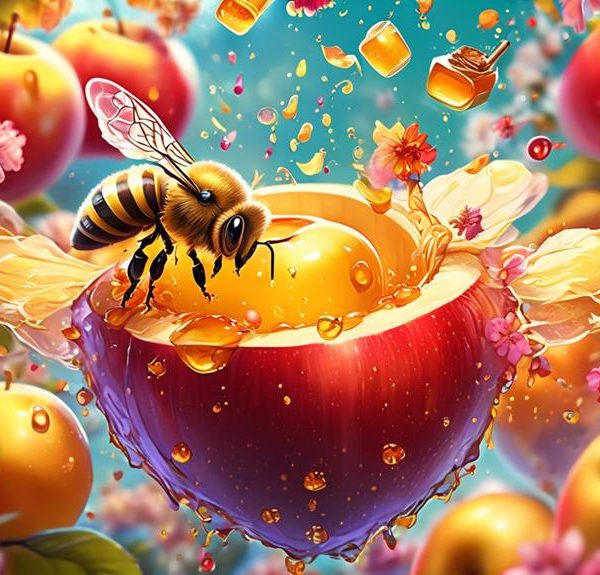Observe the world of bees and their remarkable ability to perceive time in this enlightening exploration of insect cognition.

Can Bees Perceive Time?
Just coincidentally, you've probably noticed bees buzzing around flowers in your garden at particular times of the day. You might've chalked it up to coincidence or perhaps the availability of certain flowers.
But have you ever considered the possibility that bees, just like humans, may have a sense of time? It's a fascinating topic that's been the center of numerous scientific studies.
As you navigate through this discussion, you'll discover intriguing insights into the cognitive capabilities of these tiny yet complex creatures, leaving you buzzing with more questions than answers.
Key Takeaways
- Bees possess impressive mental capabilities and exhibit an understanding of time.
- Bees can recall specific times of the day when food is available and adjust their foraging activity accordingly.
- Time perception enables bees to synchronize with the environment and enhance their survival.
- Understanding bees' time perception can inform strategies for bee conservation and aid in their protection during their most active periods.
Understanding Bee Cognition
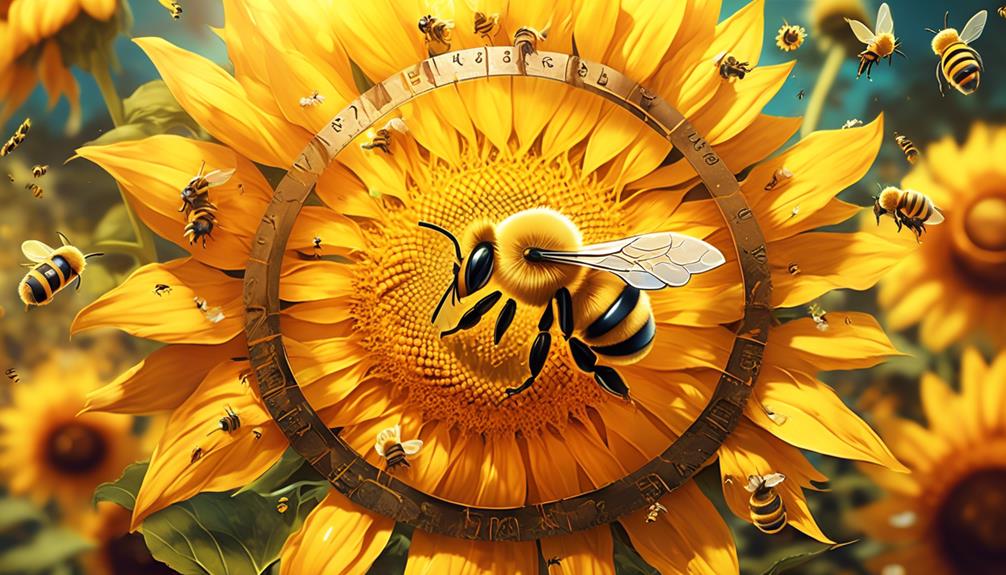
To truly grasp how bees perceive time, it's essential that we delve into the fascinating realm of bee cognition, an area of study that reveals their impressive mental capabilities and complex behaviors. As you observe a bee, you might be surprised to learn that these tiny creatures possess a level of intelligence that rivals many larger animals.
They're capable of learning and remembering information, understanding abstract concepts, and even exhibiting emotions.
Scientific research has shown that bees can recall the location of food sources, recognize human faces, and communicate complex information to their hive mates through the famous 'waggle dance'. They also possess something called a 'time memory', which allows them to remember specific times of the day when food is available. This demonstrates a form of episodic memory, one aspect of cognition that was once thought to be exclusive to humans.
Now, you're probably wondering, how does all this relate to time perception? Well, the existence of time memory in bees suggests that they've a rudimentary awareness of time. They're not just reacting to environmental cues; they're anticipating them based on past experiences. This implies a level of cognitive sophistication that's truly remarkable.
Time Perception in Animals

While bees' ability to anticipate environmental cues based on past experiences offers a glimpse into their understanding of time, it's also crucial to analyze this phenomenon within the broader context of time perception in other animals. You'll find that this ability isn't unique to bees.
Many animals, from birds to mammals, exhibit a similar understanding of time. For instance, squirrels store food for the winter, indicating their awareness of seasonal changes. Birds migrate at specific times of the year, demonstrating a time-related behavior. Even your pet dog seems to know when it's time for their daily walk or feeding.
However, it's important to distinguish between an innate circadian rhythm, which drives sleep-wake cycles and other biological processes, and a cognitive understanding of time. The former is a physiological response to a 24-hour cycle of light and dark, while the latter involves memory and anticipation.
Though it's challenging to prove, experiments suggest that some animals can indeed anticipate future events based on past experiences. This 'mental time travel' provides a survival advantage, allowing animals to plan and prepare for future needs.
The Circadian Rhythm of Bees
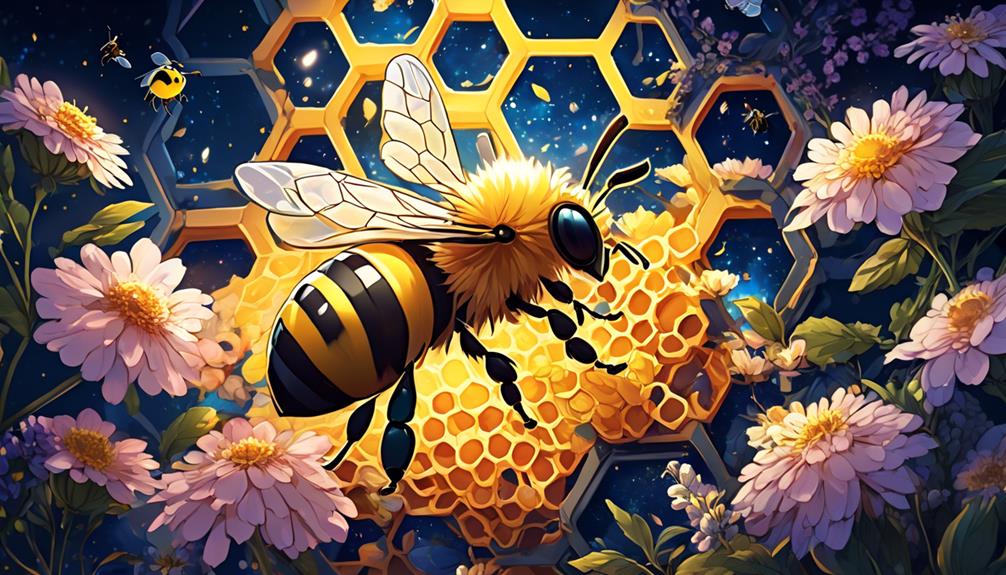
Just as in many animals, bees too have a circadian rhythm that governs their daily activities and responses to environmental changes. This internal biological clock, synchronized with the solar day, regulates their feeding, mating, and foraging behaviors.
You'll find that the circadian rhythm in bees isn't just influenced by light, but also by temperature and social interaction. Bees' sense of time isn't static, it's adaptable. Changes in environmental cues can reset their internal clocks, allowing for flexibility in responding to shifts in seasonal daylight and temperature patterns.
Research has shown that worker bees, for example, can adjust their foraging schedules to coincide with the availability of nectar-producing flowers. This means they're not just reacting to immediate stimuli, they're anticipating future events based on past experiences—evidence of a time perception mechanism.
In the hive, the queen bee's circadian rhythm influences the entire colony's activities. Her rhythm is passed onto the workers through pheromones, creating a synchronized hive behavior.
Understanding the circadian rhythm of bees provides valuable insights into their behavioral patterns, survival strategies, and the intricate dynamics within their colonies. It also sheds light on the profound impact of environmental changes on these crucial pollinators.
Scientific Studies on Bees' Time Perception

Delving into the realm of scientific research, you'll find numerous studies that have explored and provided fascinating insights into bees' ability to perceive time. In one study, bees were trained to associate specific times of day with food availability. Remarkably, the bees returned to the food source at the correct times, even without external cues, demonstrating their ability to perceive time.
Study | Method | Findings |
|---|---|---|
Eban-Rothschild & Bloch (2008) | Trained bees to associate specific times with food availability | Bees returned to food source at correct times, illustrating time perception |
Moore et al. (2001) | Investigated bees' ability to synchronize their foraging activity with flowering times of plants | Bees adjusted their foraging activity in accordance with plant's flowering schedule |
Becker (2002) | Studied bee's foraging behavior on sunflowers | Bees anticipated flowering times and arrived just before flowers opened |
These studies show that bees not only perceive time but can adjust their behavior accordingly. This time perception enables them to synchronize with the environment, enhancing their survival. You might wonder, how intricate is the bee's brain to allow such complex cognitive ability? That's a question for further research and discovery. The more we understand about bees' time perception, the more we can appreciate their role in the ecosystem.
Behavioral Indications of Time Awareness
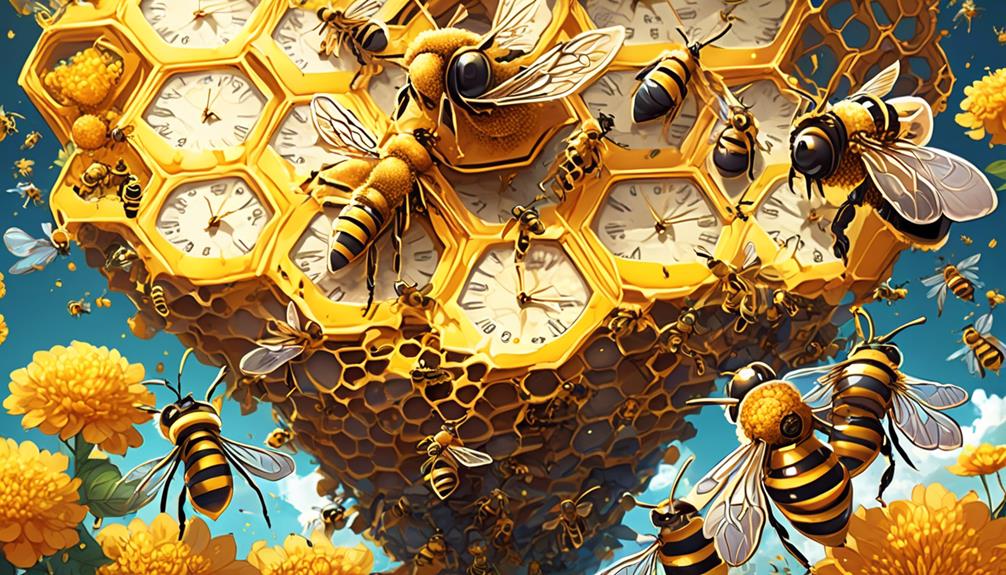
Building on our understanding of bees' time perception from scientific studies, let's now examine the behavioral indications that further illustrate their awareness of time.
You'll find that bees, like many other insects, exhibit circadian rhythms. These internal biological clocks allow them to synchronize their activities with the environmental light-dark cycle.
Look closely and you'll see bees aren't just passive recipients of environmental cues. They're actively adjusting their behavior in response to these cues, demonstrating a clear sense of time.
They're capable of temporal learning, an ability to associate events with specific times of the day. A prime example is the foraging behavior of honeybees. They've been observed to visit flowers at the same time each day, indicating they can remember the time of day when nectar is most abundant.
Moreover, bees can adjust their foraging schedules to daylight saving time changes, demonstrating an impressive flexibility in their time perception.
They've also been observed to change their activities based on the age, suggesting a possible perception of a life timeline.
Implications for Bee Conservation Efforts
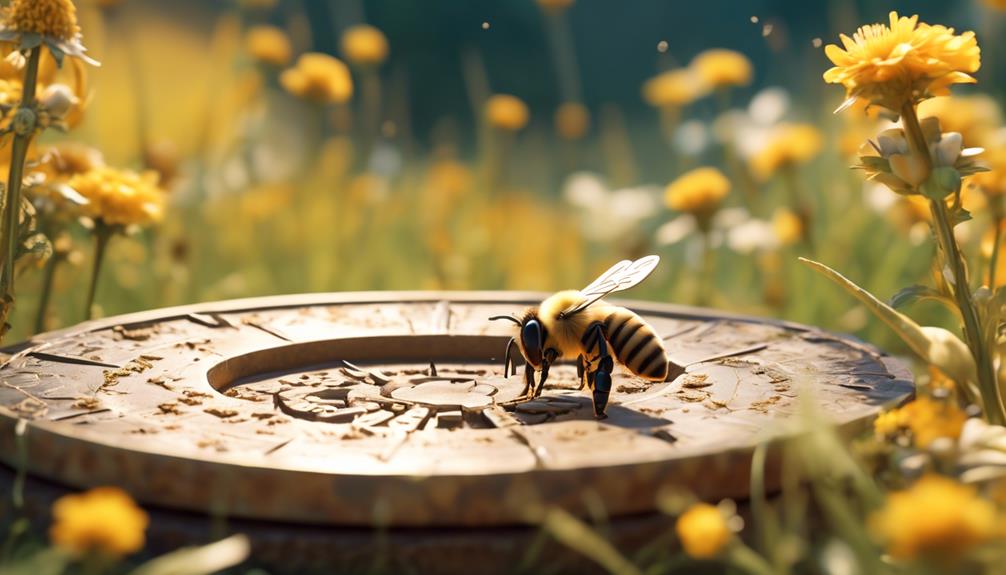
Understanding these nuanced aspects of bees' time perception can significantly enhance our conservation efforts, allowing us to devise strategies that align with their natural rhythms and behaviors. For instance, you could time the release of conservation bees to coincide with the peak foraging hours of wild bees. This could increase their chances of successful integration and survival in the wild.
By understanding how bees perceive time, you can also alter the environment to support their survival. For instance, knowing that bees can anticipate the availability of nectar, you can ensure the continuous availability of food resources in conservation areas. This would mimic their natural environment and enhance their survival rates.
In addition, insights into bees' time perception could also inform the timing of conservation interventions such as pesticide applications. You'd want to avoid times when bees are most active to reduce exposure and potential harm.
Frequently Asked Questions
How Do Bees Communicate With Each Other?
Bees communicate through a complex language of dance and scent. If you were a bee, you'd perform a 'waggle dance' to tell your hive mates about food sources. The dance's direction and duration indicate the direction and distance of the food.
You'd also use pheromones for communication, releasing specific scents to signal danger or to guide others to a new hive. It's a fascinating, intricate system that keeps the hive functioning smoothly.
What Are the Key Factors Affecting the Lifespan of Bees?
You're curious about the key factors that affect a bee's lifespan.
It's primarily influenced by their diet, exposure to pesticides, and the presence of diseases or parasites.
Poor nutrition can significantly shorten a bee's life, while pesticides can cause immediate death or long-term harm.
Parasites and diseases, such as the Varroa mite or American Foulbrood, can also be deadly.
Additionally, environmental factors like climate and habitat can play a crucial role.
How Does the Climate Change Impact the Behavior of Bees?
Yes, bees can perceive time. They're amazing creatures with an internal clock that's influenced by the sun's position. They use this to time their activities, such as foraging. It's like how you'd use your watch to time your tasks.
Plus, research shows bees can be trained to associate certain times with food availability. So, they not only perceive time but also have a sense of future. They're definitely smarter than we often give them credit for.
Are Bees Capable of Recognizing Human Faces?
Yes, you'd be surprised to learn that bees can actually recognize human faces. It's not instinctual, but rather a learned skill.
Scientists conducted experiments, showing bees images of human faces paired with sweet sugar water. Eventually, the bees began to associate the faces with the reward.
What Are the Possible Effects of Pesticides on the Cognitive Abilities of Bees?
Yes, research indicates that bees can perceive time. They're known to show time-sensing behavior, like arriving at food sources at specific times.
They've been observed to adjust their schedules according to daylight savings, hinting at an internal clock.
Their ability to perceive time helps them in their roles as pollinators, ensuring they visit flowers when nectar production is at its peak.
It's fascinating to understand just how complex these tiny creatures are.
Conclusion
In conclusion, it's clear bees can perceive time. Their circadian rhythms, behavioral patterns, and scientific studies point towards this ability. Recognizing this, your understanding of bee cognition deepens.
This insight isn't just fascinating, it's vital for conservation efforts. Protecting these time-aware creatures, you're not only preserving an intricate aspect of nature, but also safeguarding our ecosystems.
Indeed, every tick of the clock counts for these industrious insects, and for us as well.


